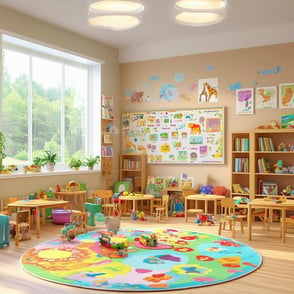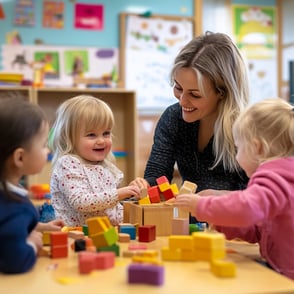As a parent, understanding the principles that underpin the Early Years Foundation Stage (EYFS) can be really empowering. It will allow you to understand the different stages of development from 3 months to 5 and a half years of age.
At Hatching Dragons, we know that parents and key workers are part of an educational team that works together to provide a holistic approach to our children. On this occasion, we’ll talk about “Learning through play”: what is it and why it’s important.
What is Learning Through Play?
According to Macentyre in 2001, there is one need that every child has, that has not changed in thousands of years. The need to play to make sense of the world around them. Whether in a cultural, social or technological aspect, children use play to repeat actions, test ideas, and confirm what they already know.
Furthermore, Broadhead and Burt discovered in 2012 that giving options to a child so they can choose what and how to learn empowers them and makes them enthusiastic about learning.
What does this mean? That children learn through play and, in repeating an action, they help form synapses that will stay with them into adulthood. Play helps them develop problem-solving and cognitive skills. It might be annoying sometimes, but all the repetitive actions that children do, also known as Schemas, have an explanation behind them.
For example, if your baby is throwing food on the floor over and over again, it’s likely that this Trajectory Schema is helping them understand gravity. They assimilate that food will always fall when they throw it. We know it kind of feels like they’re just making a mess, but it’s their own way to understand their surroundings!
Why is it important?
Children need time to explore leaves, pebbles, water, flowers, grass, their hands, their feet, clocks, sounds, tastes, the world! Everything is new to them and they need time to make sense of it.
In the Early Years, your child is still at the beginning of their educational journey. In fact, many countries will not start formal education until the child is six. This is the first time we can expect a child to sit down and learn in a more formal setting. Before then, the child’s brain is still developing and very much in ‘explore’ mode.
Many parents consider that children should sit still to learn, but it actually works the opposite way. We move around, we try things, we play with them because these are the best educational techniques for how their brain works at that stage. Your work as a parent is to provide support and give them the confidence to find their best way to learn.
How can I support it?
As the parent, you are the first place your child will come to for support and example. They will watch you, and how you do things to start to understand what they should be doing.
Engaging them in their play will help them to learn from you. It can be simple things such as playing cars with them, making the noises, talking about traffic or different types of vehicles and talking to them about their experiences.
Play can come in different shapes and forms. Role Play is one of the most important for their social development, and children are natural role players. They are very able to use their imagination to put themselves into scenes and situations that are familiar to them, and unfamiliar. As a parent, it is easy to dismiss this as make-believe; however, your child is using this time to explore how they want to be as an adult. Helping them make sense of social boundaries and expected behaviour is an important part of this. Being part of the discussion with them helps them bounce ideas off you that they need to explore.
Even simple things such as baking cookies with your child are not only fun for them, but a learning experience. It is an introduction to chemistry for a start! But also understanding food, where it comes from, healthy eating, and its effects on our bodies all can come from a simple cooking activity. This is why you will often see nurseries using it as a teaching tool. We don’t just want to eat cupcakes!
To further support your child's learning through play, consider incorporating structured yet enjoyable activities at home. For instance, engaging in homework for 5-year-olds can provide both fun and educational value. These activities not only reinforce the principles discussed but also offer practical ways to nurture your child's development.
What about Online learning?
We often provide activities in our Online Preschool that will encourage your child to continue learning in a way that may not always be obvious. For example, we might ask them to act out a creature after physical activity to encourage them to explore movement in a different way. We might also ask them to make something, such as a globe, or a snake puppet. They are encouraged to use that resource to do more learning… We don’t want them to stay still!
Why? Because we are using their natural ability to play to our advantage to teach them through this. In doing so, their brain is switched on and is learning in a way that is best for this stage in their brain development. They don’t realise they are learning, as it is a fun process for them. They are more likely to repeat the activities in their own time, helping to cement that learning into their permanent synapse. The more it is repeated, the better that lesson will stay with them for life.
You may feel your child is not engaged because they keep getting up to move. However, we have asked them to move and find things to keep it interesting to your child. They don’t want to be spoken to by an adult on a screen, they want to be included. They enjoy learning in this way, so we tailor our lessons to how they want to learn at this age.
We hope this helps you understand and feel empowered to be part of the play learning experience. If you have any questions, about learning through play, or activity ideas, please do talk to your child’s key worker. Our staff at Hatching Dragons will be happy to help you develop your understanding. We are in this together!
Tags:
Early Years
30-Jul-2020 12:18:30
Related Articles






Write a Comment